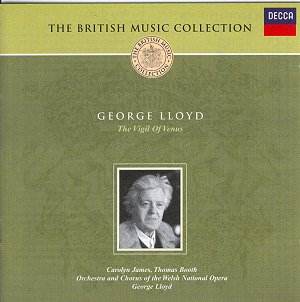I must confess that I have always struggled with the
music of George Lloyd. Let me explain.
It is not that I do not like it. I find much of it
attractive, enjoyable, interesting and moving. I certainly appreciate
his ability to write good melodies that are well-harmonised and musical
structures that are formally sound. I admire his consistent attempt
at flying in the face of the modernist and avant-garde project. But
perhaps that is part of the problem. At the risk of offending Lloyd
aficionados I feel that his music is to a certain extent primitive.
Not in a sense that he was not musically educated; he was taught by
William Lovelock and Harry Farjeon at Trinity College of Music. It is
not as if he deliberately tried to produce music that sounded as if
it was written by someone who was not formally trained. It is just the
fact that he seems to deliberately and consistently ignore new developments
in musical form and structure. Many composers have dabbled in serialism,
for example, without making a fetish of it - we need only think of William
Alwyn. It is possible to take and develop prevailing fashions. Many
composers in the 1950s were influenced by Messiaen's Turangalila
Symphony and used its structure as a model for their own creations
without writing in the French composer's style.
Yet somehow Lloyd seems to fly in the face of all musical
development. It is almost as if he has decided to ignore all that is
happening and plough his own furrow through the musical landscape.
Britten did the same, yet somehow he developed a unique
language of his own that is almost instantly recognisable. Lloyd's music
always sounds like someone else. I can never quite pin him down. If
I heard a piece of his music with an 'innocent ear' I would probably
not guess him as the composer even if I thoroughly enjoyed the work.
I would always give another composer the benefit of the doubt!
Yet all this is perhaps not fair. No-one can accuse
George Lloyd of writing pastiche music. That is not the case. What he
does is to build on much that has gone before in the musical heritage.
He is able to produce fresh sounding music that is a pleasure to listen
to and is thoroughly enjoyable. He does compose in a style that is not
off-putting to the majority of listeners. Yet does he challenge them?
On that question my jury is at present out!
The one work on this excellent CD is a case in point.
This was composed in 1979/1980 yet large chunks of it could almost have
been written at almost any time over the past century.
It is a vast choral work with solo soprano and tenor
with orchestral accompaniment. It is a setting of the late Latin work,
‘Pervigilium Veneris’, The Vigil of Venus. The words were written
as a celebration of Venus. The sentiment of the entire piece is summed
up in the words 'Cras amet qui numquam amavit; quique amavit cras amet,'
which loosely translated means Tomorrow you must learn to love those
who have never loved - and you folk who have been in love, learn to
love again! This is a recurring theme of the entire work. Lloyd
himself describes the original Latin poem as a 'spring song, a love
poem, the Creation itself.' The Latin is 'barbarous - in the sense that
it is not Ciceronian - but is probably written by someone who hails
from one of the Northern Provinces of the Roman Empire. It has even
been suggested that it could have been written by a Romano-Briton.
This is not the place to do detailed analysis of this
seventy eighty minute work. To do so without the score would be futile.
It would have been nice if the CD booklet had provided more detailed
programme notes. As it is there are a few paragraphs by the composer
on the choice of poem and a brief overview of the composer's life and
works.
However this is a huge work - both in design and subject.
There are allusions - to a variety of composers - including Wagner,
Verdi, Elgar, Holst and most certainly Frederick Delius - especially
in the final movement. This is perhaps one of the problems with this
work - there is a lack of stylistic unity - somehow it just does not
seem to be a coherent whole. Many passages in this huge work are stunning,
glorious, moving and meditative. Much of the orchestration is superb.
There are numerous passages written for orchestra alone. It is clear
that Lloyd was to become adept at composing for brass band - there are
many delicious moments for brass here. There is much fine choral writing
here that must be fun to sing.
However there are some pages of this work that seem
to me to be quite frankly padding. This may simply be because the composer
has decided to set the entire text. Much of this music is operatic in
feel rather than choral. In this way it is like George Dyson's Canterbury
Pilgrims (a greater work, I believe, than the current piece).
I wish that the translation of the Latin text had
been placed adjacent to the poem rather than following it. I found it
quite difficult flicking back and forth as my Latin is no longer strong
enough to translate at sight!
This is an interesting CD by one of Britain's lesser
know great composers. It is very much a work like the curate's egg -
good in parts. It is excellent that Decca have chosen to release this
interesting and little known work, even if it is not one of the all-time
greats in the British Choral repertoire. What it lacks in consistency
it makes up in invention and a big choral sound.
John France

